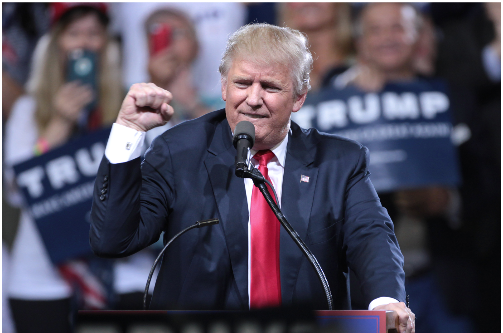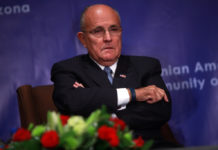
Donald Trump’s rally speech in Phoenix on August 22 was full of falsehoods. The lack of outrage over his deceptive statements points to the normalization of post-truth politics, when appeals to personal beliefs and emotions wins out over objective facts. To avoid this normalization, we need to borrow the successful tactics of the environmental movement in dealing with the pollution of our environment.
During this speech, according to highly credible fact-checking organizations such as Factcheck.org and Politifact, Trump misled the audience as to his reaction to the Charlottesville violence, such as by neglecting to mention that he blamed “both sides.” He made false claims about the media, for instance that CNN’s ratings went down when they are rising, or that the media failed to report on Trump’s condemnation of racism, when they did. In the economic arena, he stated that wages “haven’t gone up for a long time,” when actually they’ve risen for at least the last three years. Another example of economic deception: Trump wrongly claimed that the US has “become an energy exporter for the first time ever just recently.”
Where is the outrage over these deceptions? This is our President, systematically sowing misinformation. Most of his falsehoods – such as the statement about the wages or CNN ratings – had been debunked earlier. Yet he kept repeating them, leaving no other interpretation than a deliberate intent to deceive, the dictionary definition of lying.
This lying is part of a broader pattern: Trump’s Politifact file shows an astounding 49 percent of his statements, are false. By comparison, his opponent in the US presidential election Hillary Clinton’s file shows that only 12 percent of her statements were false, 14 percent for the Republican Speaker of the House Paul Ryan. Despite Trump’s extremely high rate of deception, many still believe him. As an example, 44 percent of those polled believed his falsehoods about Obama wiretapping Trump Tower during the 2016 election campaign.
Thus, many will believe his Phoenix rally claims, despite debunking by fact-checkers. Unfortunately, 29 percent of the public, and only 12 percent of Trump supporters, trust fact-checkers. This mistrust enables Trump to pollute our politics with deception, undermining the trust so crucial to the political health of any democracy.
Recognizing Trump’s success, other politicians, such as West Virginia Attorney General Patrick Morrisey and Kentucky Governor Matt Bevin, are adopting the post-truth tactics of condemning media as “fake news” whenever the media report stories unfavorable to them. As an example, Bevin personally attacked a journalist who reported on Bevin’s purchase of a mansion for about a million dollars under market value from a hedge fund manager, likely a bribe in return for under-the-table political favors. Such trickle-down of post-truth politics points to its normalization within our political system, thus enabling corruption and undermining our democracy.
How do we stop this pollution of truth by post-truth tactics? The modern environmental movement is successfully dealing with a somewhat similar problem, namely addressing the physical pollution of our environment. The historical consensus is that the launch of the modern environmental movement came with the publication of Rachel Carson’s Silent Spring in 1962. This and other similar publications brought about an awakening of the public to the danger posed by environmental pollution to individual and community health, and led to the coordinated movement of activists – Republican and Democrat – fighting for the environment.
As a result, environmental problems drew much wider public attention. Consider the 1969 fire on the Cuyahoga river in Cleveland. The river has had a long history of pollution, and in June 1969, oil-covered debris caught fire, causing $100,000 worth of damage to two railroad bridges. This event drew national attention and became a major story in Time. Cleveland’s mayor testified before Congress to urge greater attention to pollution by the federal government. Notably, the Cuyahoga river had experienced many other fires due to industrial pollution, such as one in 1952 that resulted in over $1.3 million in damages – ten times that incurred in 1969. However, this much bigger and more destructive fire inspired little national attention, or efforts to change the situation, as compared to the fire of 1969.
The marked difference in the reaction to the two fires stemmed from the launch of the modern environmental movement, combining the coordinated actions of activists to seek out and highlight these problems with heightened public attention awareness of the danger of environmental pollution. We can do the same for the pollution of truth by launching a pro-truth movement. Such a movement would require a coordinated group of activists holding public figures accountable for deception as well as publicly highlighting the danger that post-truth politics poses to the health of our democracy.
While the 1960s required the publication of books to raise awareness and launch a movement, our contemporary digital environment provides easier tools. The Pro-Truth Pledge project at ProTruthPledge.org allows private citizens and public figures to take a pledge to commit to twelve truth-oriented behaviors. This site both offers a coordination venue for those determined to roll back the tide of lies and protect our democracy, and raises awareness of the dangers of political deception. Hundreds of private citizens across the US and dozens of public figures have already taken the pledge, including household names such as Peter Singer and Steven Pinker as well as over twenty Democratic and Republican politicians.
By launching a nonpartisan pro-truth movement, we can avoid the normalization of post-truth politics. Doing so will help ensure that the kind of falsehoods uttered by Trump at the Phoenix rally get a response equivalent to the 1969 fire on the Cuyahoga river, rather than the 1952 one. Whether the pro-truth movement takes off depends on how many people choose to take the pledge and join the effort to protect the health of our democracy from the pollution of truth and destruction of trust in our political system.




